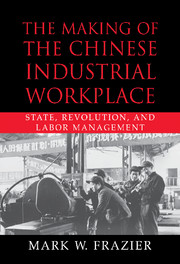Book contents
- Frontmatter
- Contents
- List of Tables
- List of Acronyms
- Preface
- 1 Introduction
- 2 Labor Management and Its Opponents, 1927–1937
- 3 Welfare and Wages in Wartime
- 4 Takeover Policies and Labor Politics, 1949–1952
- 5 Adjusting to the Command Economy
- 6 Enterprise Perspectives on the Command Economy
- 7 The Rise of “Party Committee Factories”
- 8 Conclusion
- Archives Consulted
- Bibliography
- Index
8 - Conclusion
Published online by Cambridge University Press: 15 December 2009
- Frontmatter
- Contents
- List of Tables
- List of Acronyms
- Preface
- 1 Introduction
- 2 Labor Management and Its Opponents, 1927–1937
- 3 Welfare and Wages in Wartime
- 4 Takeover Policies and Labor Politics, 1949–1952
- 5 Adjusting to the Command Economy
- 6 Enterprise Perspectives on the Command Economy
- 7 The Rise of “Party Committee Factories”
- 8 Conclusion
- Archives Consulted
- Bibliography
- Index
Summary
In its effort to gain the support of and ultimately control China's small but critical industrial working class, the CCP drew upon the “debris of the old order,” to revisit Tocqueville's metaphor. Just as prerevolutionary institutions whose emergence Tocqueville charted prior to 1789 enhanced the power of the state in postrevolutionary France, so too in China did institutional changes within factories in the 1930s and 1940s culminate in a central organizing vehicle for the Chinese state in the 1950s. While the Chinese state post-1949 significantly expanded its control over the industrial sector and the laborers within it, innovative national policies and top-down mobilization efforts were embedded in and influenced by an existing structure.
The danwei as it evolved in Chinese industry can be understood as a matrix of labor management institutions overlaid at different periods between the 1930s and the late 1950s. Economic and political crises of various sorts described in the preceding chapters mandated state intervention in the relationship between employers and workers. During such periods of crisis, state officials devised new institutions of labor management and workers and managers embedded these institutions within existing norms and rules. For example, when central government officials introduced the eight-grade wage scale, managers and workers within factories resisted the skill-based criteria of the national wage regime. For political and technical reasons, managers and workers maintained an informal wage regime that favored older workers at the expense of newer workforce entrants.
- Type
- Chapter
- Information
- The Making of the Chinese Industrial WorkplaceState, Revolution, and Labor Management, pp. 234 - 258Publisher: Cambridge University PressPrint publication year: 2002

